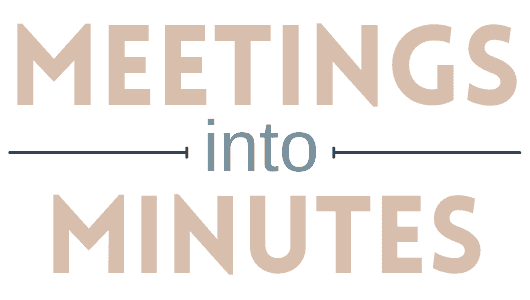For simple and easy minute-taking for your next meeting, we have a guide to help you have professional minutes that will help you and your business for future meetings.
What are the minutes of a meeting?
Many people have heard of minutes of meetings, but don’t really know what minutes really are. Minutes are in fact a hugely important part of the planning of process of a meeting. They help your meeting to stay organised, provide better structure, can be used to measure progress and are also a reliable document for legal purposes. Whether you’re running a small business or a large corporation, meeting minutes are very important.
How do you take minutes?
If you’ve been given the responsibility of taking the minutes for your next meeting, you may be feeling a little overwhelmed (especially if you’ve never done it before). But, taking minutes doesn’t have to be complicated. There are a few ways to simplify your minute taking and ensure you have everything you need for accurate minutes.
Prepare for the meeting
Every organisation will have different ways of preparing their minutes for record-keeping. Have a discussion with the board president about any expected formats they wish you to use. Another good way to understand the way minutes are recorded for the business is to look at the previous meeting minutes. This can show you the way the previous minutes were prepared and what has been accepted in the past. Continue your preparation by asking for a copy of the meeting agenda and a list of attendees.
Take a record of the meeting
Depending on your organisation, you may be required to type your minutes. However, sometimes there isn’t a specific requirement, in which case minutes can be typed or written in longhand (although many professional minute-takers will use shorthand). There will be a number of items that are to be included, but some of the most important ones include:
– Date of the meeting
– Time the meeting was called to order
– Names of attendees, people absent and participants
– Corrections to the previous meeting minutes
– Any additions to the agenda
– Taken and rejected motions
– Outcomes of voting procedures
– Next steps
– Next meeting schedule
– Time of meeting conclusion or adjournment
Avoid including any remarks or personal observations. The minutes of a meeting are there to provide a comprehensive overview of the actual events that occur at a meeting. One way to avoid personal bias is to check the language you use in the minutes and ensure they are accurate, factual and complete.
Because minutes for meetings can be used for legal proceedings, this makes it even more important for the minute-taker to be clear and concise. Keep information basic and to the point to avoid any legal repercussions that put the company at a disadvantage during legal proceedings.
Write the official record of meeting minutes
This is a good time to clarify what happened during the meeting and ensure all notes and minutes recorded are clear, accurate and not biased in any way. Review all motions, votes, actions and decisions to ensure they all make sense and are easily interpreted by anyone. Minutes need to be clear and easy to understand so even those not in attendance have a clear idea of what happened throughout the meeting.
Signing, filing and sharing minutes
For minutes to be complete and official, they need to be signed off by the board secretary. Depending on your workplace or organisation, they may also need to be signed off by the board president. Your organisation will likely have their own protocol and methods for storing minutes, so be sure to follow any of these methods.
Taking minutes sounds like it’s just too hard. Isn’t there an easier way?
Of course! One of the best things you can do to ensure the minutes for your meetings are complete, accurate, professional and concise is to organise an independent minute-taker who can handle the minutes for you. An organisation such as Meetings Into Minutes can do just that. Whether you need a regular minute-taker for meetings occurring on a weekly basis, or you just need someone to fill in for the day, it’s all possible.
If you need a minute-taker for your next meeting, contact the professionals at Meetings Into Minutes. They can provide you with excellent service and professional minutes for all types of meetings.




